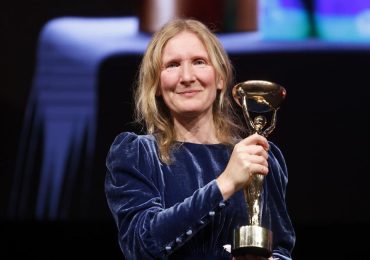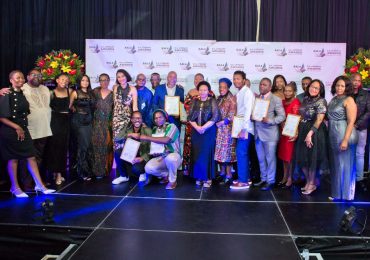Maureen Isaacson reports from Stockholm, Sweden, on the latest developments around the scandal engulfing the Nobel Prize in Literature.
The battle for the soul of the Swedish Academy continues, with the cancellation of the 2018 Nobel Prize in Literature its latest casualty.
A statement released by the body says the decision to delay the announcement of this year’s laureate is based on ‘the currently diminished Academy and the reduced public confidence’. (The Academy says two prizes will instead be awarded in 2019.)
The Swedish media has aptly characterised the Academy’s crisis in confidence, with an unresolved sexual assault scandal at its core, as a soppa—a soup. A mish-mash of accusations, denials, conflicts of interest, complicities and betrayals have tarnished its reputation, and Swedish Prime Minister Stefan Löfven has worried publicly about how this will, in turn, affect Sweden’s reputation. He told Sweden’s national newswire service, TT Nyhetsbyrån, the it was ‘oerhört tråkigt’—’incredibly unfortunate’.
The background to the crisis, at least, is now in the open. Eighteen women accused French-Swedish photographer Jean-Claude Arnault of assault in November last year, in tandem with the #MeToo movement. Arnault is married to the poet Katarina Frostenson, an Academy member until last month.
The women testified to sexual assault by Arnault in Stockholm’s Dagens Nyheter newspaper in November, 2017. Incredibly, Academy members claimed ignorance, despite previous, similar reports about Arnault having been published in the Expressen newspaper some twenty-one previously. The Academy’s then-permanent secretary, Sture Allén, had dismissed the reports as ‘unimportant’.
This was the old guard talking. Sara Danius, who was installed in the Academy in 2013 and who assumed the position of permanent secretary in 2015, represents the new. She ordered a legal investigation into Arnault’s activities, and when details of Frostenson’s seeming conflicts of interest surfaced, Academy members took sides. Danius’s move to expel Frostenson in April was disregarded by a majority. Simultaneously, members of this same majority gunned for Danius, with former permanent secretary Horace Engdahl publicly denouncing her performance as the ‘least successful since 1786’. The fallout was that six members stepped down—including Danius and Frostenson.
Visuals of several hundred of Danius’s supporters protesting outside the Academy’s quarters in Stockholm’s Old Town, shouting ‘Down with the patriarchy!’ did the institution no favours. As it seeks to recover, some of its remaining members are backtracking on earlier proclamations, including Engdahl, who has now said he will do what it takes to bring back those who left. A lesser-known public battle with his former wife, Ebba Witt-Brattström, a literature professor at the University of Helsinki, may have helped him reconsider. She publicly berated ‘the gang of dark men’ who run the institution; and her revelation that Engdahl had leaked the names of laureates to her before they were announced was hardly as staggering as her report of having witnessed Arnault’s groping the Swedish Crown Princess Victoria at a public event in 2006. The extent of the groping was reportedly such that the princess’s aide was obliged to fend Arnault off, and the royal palace saw fit to request that Arnault never be left alone with the her. But even the palace was apparently, then, prepared to turn a blind eye on sexual assault, for the sake of appearances. Witt-Brattström is among the many suggesting that the entire Academy should step down and the process of awarding the prize begin anew.
Others in the media have suggested, in the wake of the scandal, something even more radical: that the award should not exist at all. The sense of creeping destruction is such that, in response, Svenska Dagbladet cultural editor Lisa Irenius insisted on Sunday on the vital role played by ‘the only international prize that awards literature in all languages and which singles out literature of superior quality’. The charge of eurocentrism, meanwhile, has also come roaring back. If the Academy really wants to restore international respect, it has been suggested, it should include international writers on its panel. Surely the institution’s crisis presents an ideal opportunity to bring about such change.
However, on that score the Academy seems intent on letting the crisis go to waste: there has been no talk of outsiders being admitted. The Chairperson of the Nobel Committee for Literature within the Academy, Per Wästberg, has announced that three new members will be instated next month.
While Wästberg publicly supported Frostenson’s expulsion, his own resignation was never an option. In an email exchange with The JRB, Wästberg said: ‘Frostenson has never with one word conceded a fault, a mistake, but defended herself and painted her husband as crucified, Jewish, French, persecuted by a media mob.’
Wästberg, who had recommended Arnault for a Swedish King’s Medal, was apparently shocked when the sexual assault accusations broke. ‘His [Arnault’s] sexual assaults are many more than I could ever have imagined,’ he said. Wästberg has called Frostenson a liar; and Arnault continues, through his lawyer Björn Hurtig, to deny the accusations, which he characterises as a witch-hunt. He has now threatened to sue Wästberg.
Wästberg declined to respond to many of The JRB’s questions, but he robustly defended the Academy as an institution with a heritage and tradition worth preserving and reforming, calling it a unique, independent body with responsibility for awarding writing of all kinds and genres. It was also responsible for the preservation and promotion of the Swedish language and its history, he said.
‘How I survived?’ said Wästberg. ‘The Academy is no concentration camp, it is a lively open-minded group of people who discuss and argue freely round the same table: “largesse!”’





